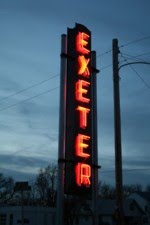English news from Rhoda Wahl, E-M English Instructor
Panem Publishers Herald Hunger
Games
In
between prom, track, golf, and sending out graduation announcements, seniors in
the dual-credit English class at Exeter-Milligan High School are devouring the
hot new best seller, The Hunger Games. After conquering A Tale
of Two Cities, and analyzing books on the American Library Association’s
list of banned books, they are devouring the story of survival in a
surrealistic world of the future.
As
they read, they also wrote and edited their own newspapers about events in
Panem. Each edition featured a news item about the events of the games, as well
as articles from other sections found in most newspapers. Here are some of
their reflections:
Arts
& Entertainment – How real is Reality TV? The Hunger Games are the “Reality
TV” of the future. How is the televised Hunger Game similar and/or
different from the reality TV games of 2012?
· Becca
Vossler: I think “Reality” TV is not real at all. They are just putting on
a show to entertain you, or what else is the point of a TV show? They have
people saying “say this--not that!” or “wear this--not that”. They do the same
thing in the yearly games, but they publicize those people, not hide them. They
are very similar in the aspect of how people help them perceive the image they
want shown.
· Brady
Bristol: The Hunger Games played out in this book are like today’s Reality
TV. In most TV shows, people win money for lasting the longest, such as Survivor,
Fear Factor, or Big Brother. In The Hunger Games the
contestant that lasts the longest is the only one that will keep their
life. It is a very brutal twist to a TV reality show. If you have ever
seen the movie The Tournament, it would remind you a lot of the Hunger
Games. They use basically the same story line, except they use criminals
instead of children. They give them each tracking devices so they can
hunt the other competitors. It is a very violent show, but the public is
able to watch it on television and bet on which player will win. Reading The
Hunger Games often puts a picture of The Tournament into my mind.
Opinions
& Editorials – What is Suzanne Collins message? This story is set in a
world where the government forces children to be sacrificed in a violent
way. Writers often create hyperbolic, thought provoking stories to reveal
flaws in our world. What message do you think the story’s creator is trying to
express with this dark tale?
· Claire
White: I think the writer is exaggerating the political issues of our time.
The government of Panem is overwhelming, controlling, and completely eliminates
freedom. In Panem, the citizens are kept in districts surrounded by fences.
They are told when to start and stop working each day, they are not allowed to
do or say anything against the government. Peacekeepers live in each district
and monitor the citizens. Katniss and her family almost died of starvation
because it was so hard to make money and buy food. I think it shows that big
government will only lead to a failing, terrible country in the future portrayed
by Suzanne Collins.
· Jalen
Maxson: I can definitely see how the Capitol keeps a strangle hold on the
entire country of Panem. The games themselves play with their citizen’s lives
for entertainment. Adding a fire during the game, to speed up the process of
kids weeding themselves out, is cruel and insane anywhere it happens.
Business
& Economy – What are the major industries of Panem? - We know that
District 12 survives on mining coal, but what other industries support the
other districts.
- Quinten Loontjer: The economy of Panem is probably most similar to
a planned economy. A planned economy is one where the government
establishes all of the major sectors of the economy and makes all of the
important decisions about it. In the Hunger Games, the Capitol controls
who gets rations and how much they get. The Capitol, which is in District
1, established the Districts and their economies.
If
you are a fan of The Hunger Games, we hope you will enjoy reading more
about the games. We also hope that those, who haven’t yet read the book, will
want to read the book for themselves. We guarantee you won’t be able to put it
down!
Members
of the English IV Dual Credit class: Front (L-R) – Nathan Bigelow, Becca
Vossler, Claire White. Back (L-R) – Brady Bristol, Jalen Maxson, Quinten
Loontjer.



